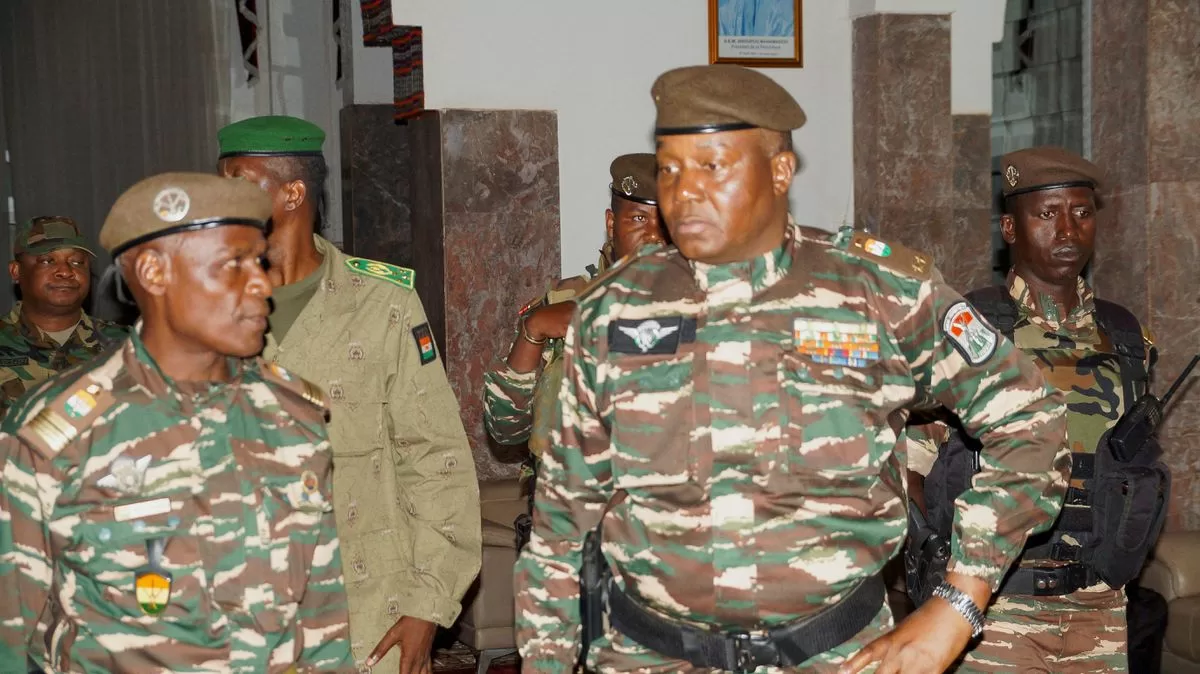The military regime that emerged from the coup perpetrated on July 26 in Niger has formed a government, according to a decree of the country’s new strong man, General Abdourahamane Tiani, read on national television early Thursday morning. The announcement came hours before the celebration in Abuja (Nigeria) of a crucial summit organized by the Economic Community of West African States (Cedeao), where “important decisions” are expected to be made, according to the organization, on the response of the neighbors to the crisis that the country of the Sahel is experiencing.
The new Nigerian government marks the consolidation of the military regime that deposed the elected president, Mohamed Bazoum. It is headed by economist Ali Mahaman Lamine Zeine, who will serve as prime minister, and includes 20 ministers. Of these, those of Defense and Interior are generals of the National Council for the Safeguarding of the Fatherland (CNSP), the group that took power.
Lamine Zeine, who was already presented as prime minister on August 7 in another televised ad, has an extensive career in politics. A 58-year-old economist by training, he was former president Mamadou Tandja’s chief of staff in 2001 and a year later was appointed finance minister to try to address the difficult economic situation in Niger, one of the poorest countries in the world. He held this position until 2010, when Tandja was overthrown in a coup. Lamine Zeine belongs to the political formation of this former president, the MNSD-Nassara, a former single party. He has also been the resident representative of the African Development Bank (AfBD) in Chad, Gabon and the Ivory Coast.
Cedeao has not yet ruled on the formation of this new Executive. Its members meet this Thursday morning for their second extraordinary summit in less than two weeks. The previous one took place on July 30 and it was agreed to give the coup leaders a seven-day ultimatum if they did not return the deposed president to power, something that has not happened. Nigerian President Bola Tinubu, who is also the ECOWAS turn head, has stated in the opening speech of the summit that it is crucial “to give priority to diplomacy in the search for a return to constitutional governance in Niger”. .
The military junta that governs Niger also refused last Tuesday to receive a tripartite mediation delegation made up of representatives of ECOWAS, the African Union and the UN. However, this Wednesday the Nigerien coup leader, Brigadier General Abdurahamane Tiani, met with religious authorities from Niger and Nigeria. Among them, Tiani met with the former governor of the central bank of Nigeria and the ex-emir of Kano (the largest city in northern Nigeria), Alhaji Muhammadu Sanusi II, who later visited Tinubu.
According to what the former emir declared to the Nigerian press, he was not sent by the Nigerian government to speak with the coup leader, although he was aware of the meeting. After this he went to inform President Tinubu of the details of their talks in order to “do everything possible to bring the two parties closer to improve understanding.”
Join EL PAÍS to follow all the news and read without limits.
subscribe
ECOWAS has reiterated its preference for diplomatic means to “restore constitutional order” in Niger, but does not rule out the use of force. Between August 2 and 4, the military chiefs of the countries that make up this organization also met in Abuja and drew up a plan in case the regional bloc decided to deploy a possible military intervention in Niger.
Pending the decisions of the heads of state and government of the regional bloc, the coup junta of Niger decided this Wednesday to raise the alert level of the Armed Forces, while accusing France of trying to destabilize the country. The new leaders in Niamey see ECOWAS as an organization “in the pay” of France, a former colonial power. The military accused her on Wednesday of having violated the airspace closure in force since Sunday and of having “liberated” “terrorist prisoners”, facts that were quickly denied by Paris.
Meanwhile, in Niger an internal resistance has emerged seeking to restore Bazoum. Last Tuesday, the former Minister of State of the deposed government, Rhissa Ag Boula, announced the founding of the Council of Resistance for the Republic against the coup. Ag Boula, is an important former Tuareg rebel leader and has declared his “unwavering support” for ECOWAS initiatives.
Niger is the fourth country in the region to experience a coup since 2020, after those in Guinea, Mali and Burkina Faso. This country was one of the last allies of Western countries in the Sahel region, destabilized by the violence of Islamist groups present in the area.






